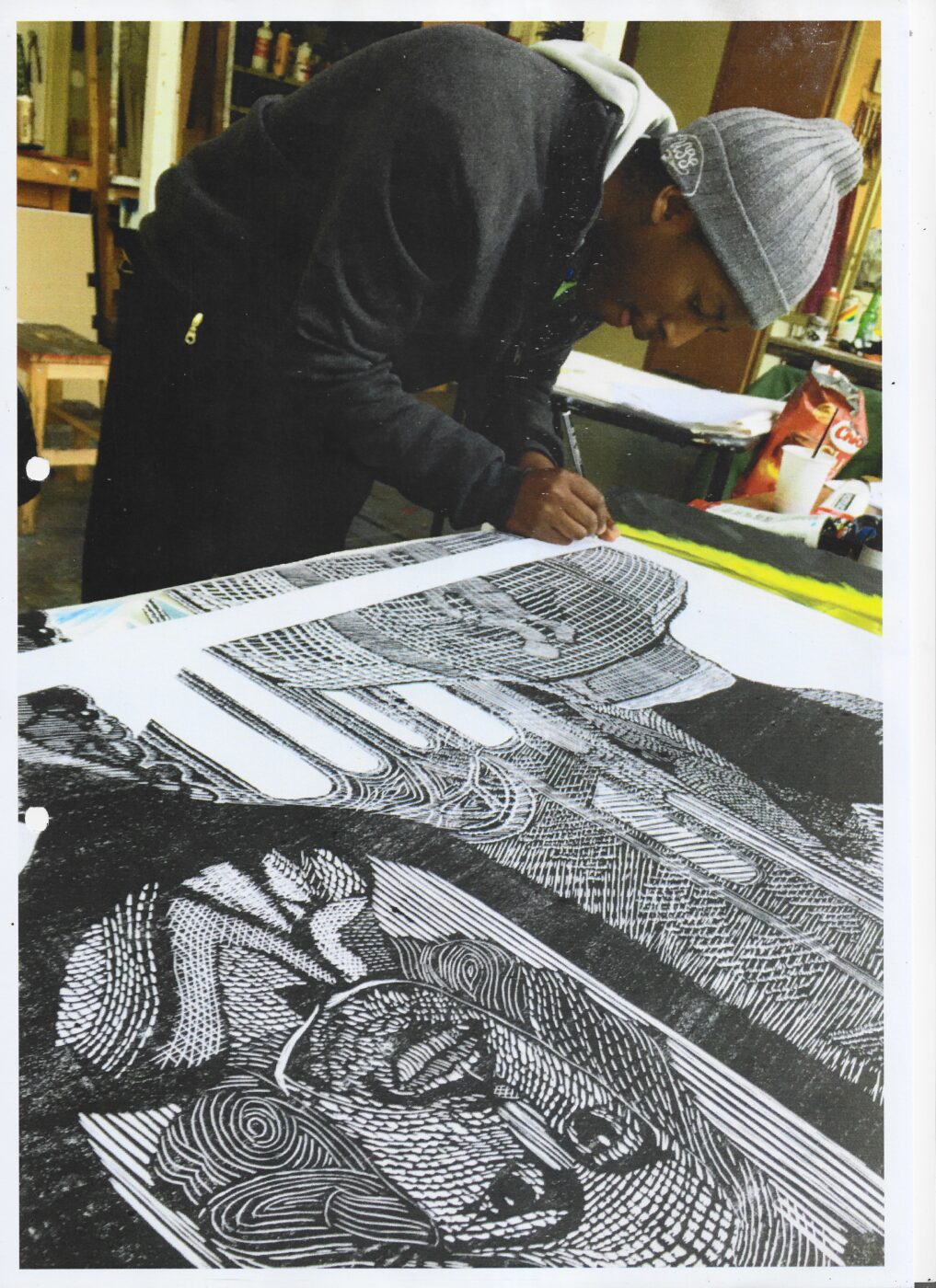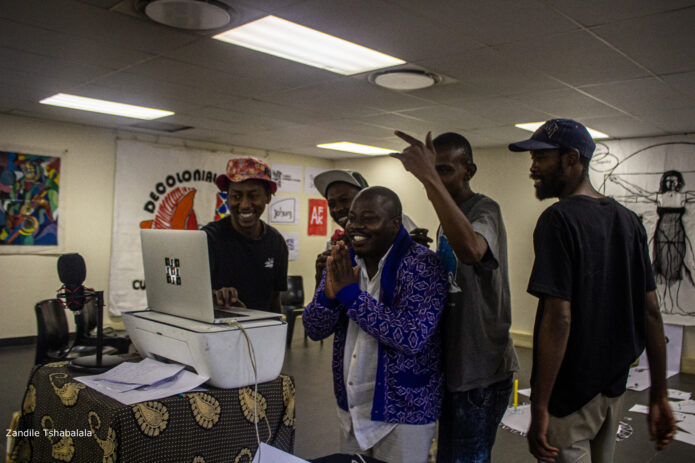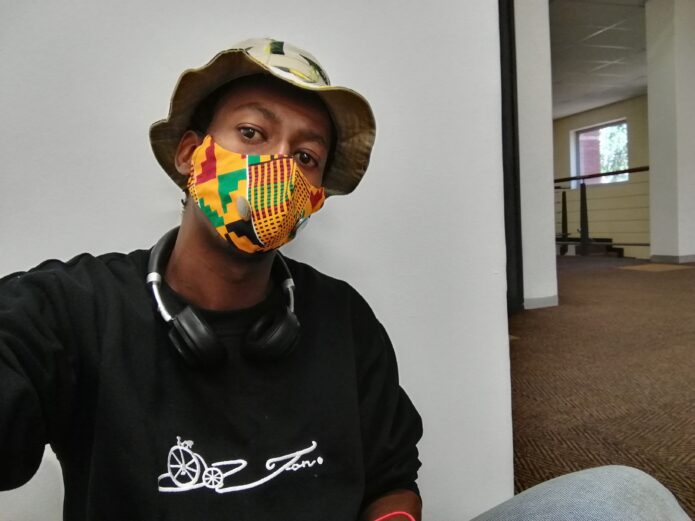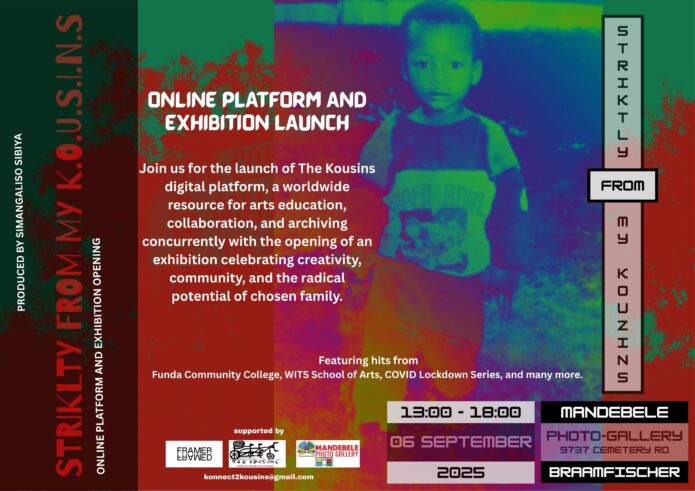 Simangaliso Sibiya signing the work, Reflect Your Hopes.
Simangaliso Sibiya signing the work, Reflect Your Hopes. Simangaliso Sibiya and The Kousin’s Project
Writer and journalist Alfred T.M. Rossouw sat down with South African artist, curator and educator Simangaliso Sibiya to discuss his work with artists at Funda Community College, the Decolonial Futures project with Framer Framed and his new endeavour of The Kousin’s Project.
Text: Alfred T.M. Rossouw
March 2023
Situated in Diepkloof, Soweto, Funda Community College is a centre that was built to provide a source of arts education in the aftermath of the student uprisings in 1976. The uprising happened in response to the introduction of Afrikaans as the medium of instruction in local schools, and Funda Community College was one of a very small number of institutions that provided education in the arts for Black South African students in a language they both knew and understood. Since its establishment in 1984, right at the height of the Apartheid regime, the centre has produced many graduates in the theatre, visual arts, and music programs it offers.
Many of the students who graduated from the centre ended up having successful careers in their chosen fields of study, and one such student is Simangaliso Sibiya.
Born in Soweto, Simangaliso Sibiya, better known as Mbhekeni Enjubren amongst his friends, only took his work as an artist serious after matric. His first choice of study was graphic design after seeing a video of a child drawing on a computer on TV. He registered for the course at a local college after matric, but after struggling to find money to continue his studies, he dropped out after only one term. He later found a job and, after saving up enough money, he went back to continue his studies at PC Training and Business College, where he was meant to study Web Design for two years.
After studying at the college for only three months, Simangaliso dropped out of the institution and used the remaining eighteen months to start a T-Shirt printing business and meet other aspiring artists around his township.
While interacting with other artists, Simangaliso developed a love for building spaces for artists in the township after one of his friends invited him to an art class he was hosting for children one Saturday morning. While at the venue, Smangaliso ended up taking over the class, and that began a journey that would lead him to many more projects that were similar. He later found a job paining a pre-school with the famous artist John Vusi Mfupi. Mfupi then introduced Simangaliso to Funda Community College, and the young man ended up studying visual arts there for three years.
While at Funda Community College, Simangaliso learned many skills that would turn him into the artist that he is today. “Most of my creations, if not all of it, are based on the principles I learned at Funda,” Simangaliso explained.
As an art centre, Funda has been teaching alternative art education for a long time. During the first year’s curriculum, artists are taught how to find out who they really are by looking through their cultural experiences. During the second year, the artists are then taught how to develop concepts using what they learned during their first year, and in the final year, they are asked to create a project using everything they have learned. It was during his three years at Funda that Simangaliso found himself as an artist, and he continues to use the knowledge he gained there to produce some of the most critical and engaging artworks you will ever come across.
After graduating from Funda, Simangaliso took part in many projects and exhibitions. One of the projects he was part of was the Decolonial Futures Programme.
Established in 2017 to tackle issues around questions of decolonisation in the context of art and education, the Decolonial Futures Programme is an exchange programme organised between the Sandberg Instituut, the Rietveld Academie, Framer Framed in Amsterdam, as well as Funda Community College. According to their website, “the programme was inspired by the desire to work collectively towards a decolonial future in which an equal exchange of knowledge and perspectives from students working across the discipline of art and design could be established”.

Simanga (left) pictured during the workshops during the Decolonial Winter School, 2022. Photo © Zandile Tshabalala
Simangaliso first took part in the project during his final year at Funda, after he was invited to a workshop at the June 16 Interpretation Centre by Mr Khwezi Gule, who is the chief curator at the Johannesburg Art Gallery. The workshop was called the “North Winter Workshops – Ways of Being an Artist in the World”.
At the workshop, Simangaliso was chosen as one of three students from Funda who will take part in the Netherlands leg of the programme for ten days. But, while he was waiting for the trip, Simangaliso also learned that he had also won the Thami Mnyele Residency Award, which is an art residency programme that takes place over three months in the Netherlands. He later took part in both programmes and ended up producing work that critically engaged some of the experiences he had while he was in the Netherlands.
Upon his return to South Africa, Simangaliso went back to doing work with artists in the community. He later enrolled for an internship programme at the Johannesburg Art Gallery (JAG), where his interaction with the organisation “The Friends of JAG” sparked an idea to create a self-sufficient organisation that will help local artists reach a much bigger audience. The project that was later born from this interaction was The Kousins Project.
“The idea came to me [after I realised] that some friends are not good for us,” Simangaliso said, explaining how the project had come about. “So, [I figured], how about we bring in cousins because, if you are a cousin, you are family, and you have something to lose.”
The project, Simangaliso explained, will work in two ways. The first is to establish a self-sufficient organisation on the ground. The organisation will include a list of creatives who live and/or work around townships or previously disadvantaged areas, and it will be used to help cultural practitioners meet-up, connect, collaborate, and share resources. The organisation will also organise workshops on how cultural practitioners can apply for funding, and it will also invite curators to meet local artists and see the context in which their work is made.
The second way in which the organisation will work is to build an online index of local artists that will include artists’ information, including what they do, how to contact them, and other information.
“The index will start off as a database of creatives we live and work amongst, but it will later grow into something else,” Simangaliso went on.
One of the projects Simangaliso hopes the index will grow into is a Favela Biennale, or Township Biennale. The first biennale will be hosted in Soweto, a township known for its cultural and artistic diversity. The aim of the biennale will be to unite local artists and create a space for them to share their work with each other and other people. It will also help artists to connect with customers and possible customers and teach people what they do.
“As creatives amongst township spaces, we are all over the place,” Simangaliso explained. “We don’t know who does what, when, and how … [and] as much as we work and play in [our local townships], a majority of our income doesn’t really come from the spaces we are in.”
Simangaliso believes the project will be perfect for a place like Soweto. Known for having produced some of the greatest artists to ever come out of the South Africa, there is not denying the talent that is present in Soweto. But, most of the time, many people never get to experience this talent because of the little exposure that artists ever get, and this is where the Kousins project will come in. Through the project, many of these local artists will have the opportunity to showcase their work to a much bigger audience and gain even more knowledge about their craft through the workshops the project will host.
The main aim of the Kousins Project is to empower artists everywhere and give them a chance to earn a living through their talent.
Simangaliso sees his role in the project as a mainly administrative one. “Because we are building Kousins, I look at my role [in the project] as that of an uncle,” he said, but then added that his role as an uncle will only be administrative. “The project,” he explained, “will not be controlled by an individual. Instead, it will be allowed to live its own life and take its own direction.”
Simangaliso hopes all the lessons and experiences he has gone through over the years will come together in the building of this project. He hopes to make Funda Community College the base of the project, where they will build the organisation from the art school. He also hopes to use The Decolonial Futures Project to help facilitate interactions between the Sandberg Instituut, the Rietveld Academie, and Funda Community College in order to build the website that will host the index of artists.
Alfred T.M. Rossouw is a South African based writer and editor with over five years of writing, editing, blogging, and book reviewing experience. He has worked across many industries, including literature, arts, and both the public and private sectors. He currently works as a freelance editor and writer, and some of his experience includes working as a freelance editor and writer for FunDza Literacy Trust and Gecko Publishing. Under the penname Thato Rossouw, he has also written multiple articles for many publications, including News24, The Mail & Guardian, Africanah Magazine, Art State, The Huffington Post, and The Sunday Times.
The Decolonial Futures Project is a collaboration between Funda Community College, Soweto, Sandberg Instituut, the Gerrit Rietveld Academie and Framer Framed, Amsterdam. It is supported by the Amsterdam Fund for the Arts (AFK).
- Funda Community College - Soweto
- Sandberg Instituut - Amsterdam
- De Gerrit Rietveld Academie
- Stichting Thami Mnyele - Amsterdam
Links
Gedeeld erfgoed / Action Research / Koloniale geschiedenis / Zuid-Afrika /
Netwerk

